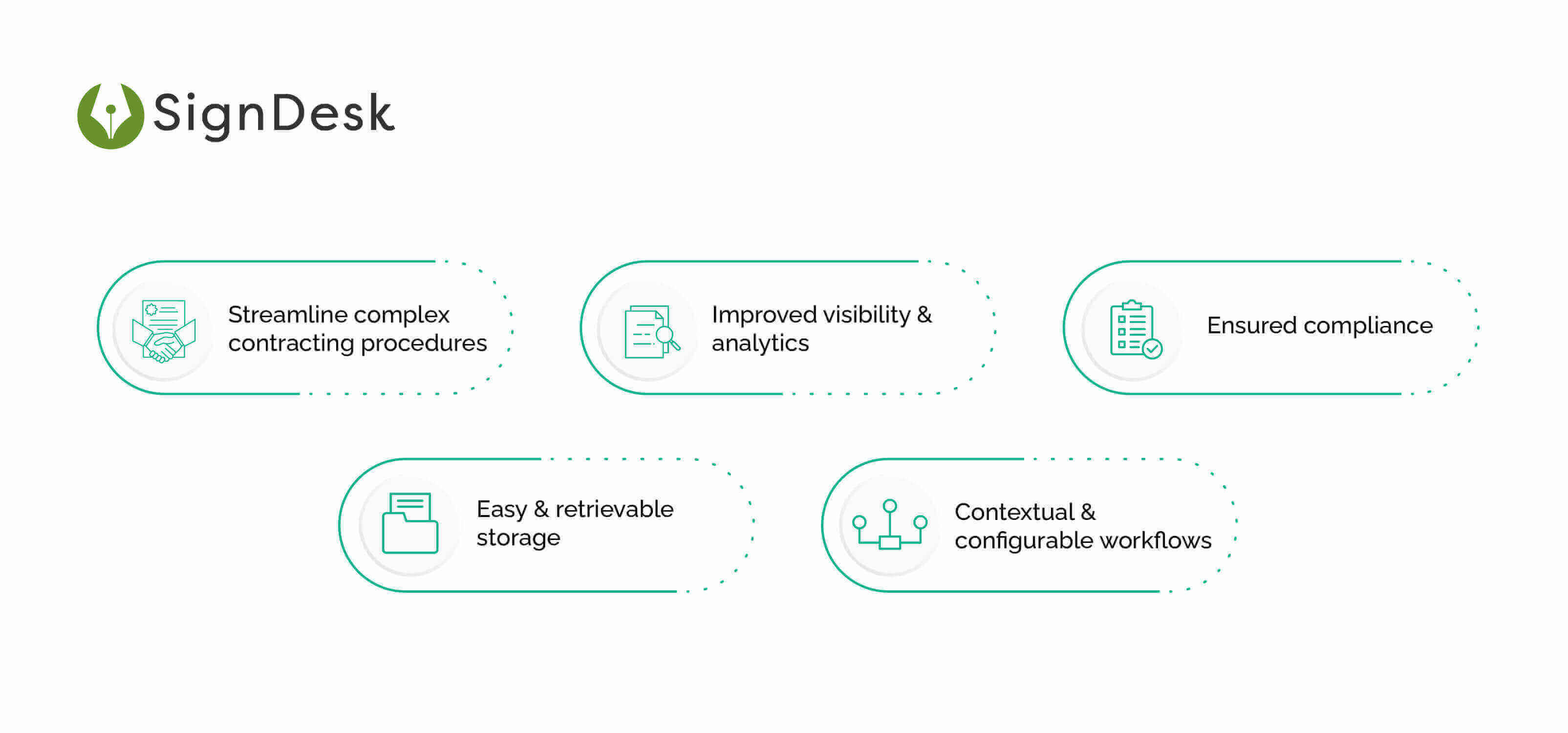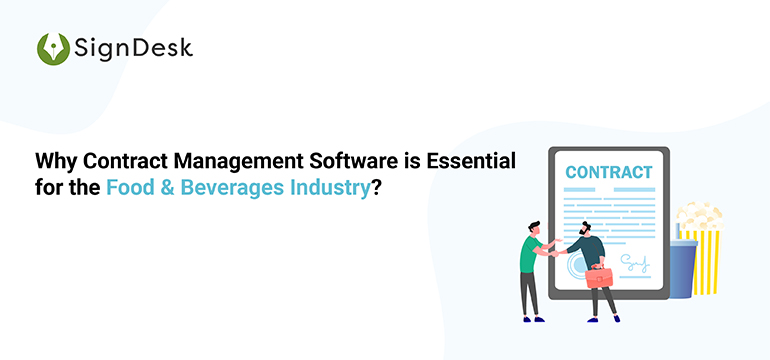Contracting in the Food & Beverages Sector
The Food & Beverage (F&B) industry has numerous regulatory issues, including ensuring adherence to the Food Corporation of India (FCI) and Department of Agriculture of India’s (DAI) ever-increasing compliance standards. The growth of new distribution channels has been ascribed to the rising e-commerce sector, and F&B companies are constantly under pressure to reduce the risk of supply chain interruptions and friction in both customer delivery and distribution channels.
Additionally, the risks posed by pesticides, cancer-causing chemicals in food, genetically modified organisms (GMO), and large-scale food waste require stringent regulations and strict compliance. Due to these risks, the food and beverage industry is heavily regulated and examined by regulatory authorities in every target market.
A contract management solution for the food and beverage vertical can assist risk and compliance officers in ensuring organization-wide efficiency at every step without allowing policies to turn into bottlenecks for business operations.
These businesses deal with fast-changing competition, fluid global trade, and shifting rules and regulations. Businesses must become more agile and maintain close relationships with their customers and suppliers to remain competitive.
The food and beverage industry faces many contractual issues, including recruiting various types of vendors, sales, and corporate contracts. If not acknowledged, these issues can result in higher capital costs, expensive foreclosures, and customer complaints.
Contract lifecycle management provides food and beverage suppliers with the tools to overcome these complex challenges.
What is Contract Lifecycle Management?
The employment of a set of smart automation platforms to aid in achieving a contract’s aim, compliance with duties, and risk avoidance or mitigation is known as Contract Lifecycle Management. The tools used in this automation process involve smart CLM software.
Contract Lifecycle Management refers to procedures that automate each stage of a contract’s life cycle using a smart contract management system.
- Request: A contract request is submitted by the legal or sales teams.
- Creation: Contracts are swiftly drafted using customized templates or AI-powered clause suggestions.
- Negotiation: Stakeholders negotiate contracts online.
- Execution: eSignatures are used to sign contracts remotely.
- Storage: Contracts are categorized and stored in a central database.
- Performance and Tracking: Software keeps track of contract performance and delivers valuable data.
- Renewal: Contract renewal occurs when stakeholders receive customized contract expiration notices.
Prevalent Contracts in the Food and Beverages Sector
A food service contract is a contract between one or more parties and a food service provider. This could include school food services in certain situations and meals supplied for an occasion in others. This contract ensures that all parties receive what they agreed to, and it also helps to minimize future issues caused by misunderstandings.
Food contracts are in high demand when it comes to government contracting. Food contracts span a wide range of services, from food supply to food equipment, vending machines to food catering. This industry is not only diverse, but it is also one of the most sought by government organizations. For which clm software for the food industry is necessary.
Food RFPs, or “request for proposal,” is necessary for many places, including colleges, hospitals, parks, airlines, agriculture, and the military, to mention a few.
A food service contract is simply a deal between a restaurant or food service establishment and an organization. The contracts and agreements are done mainly to help people who need food. Constituting all the terms and conditions in detail, the deal is pulled off with the help of clm software for the food and beverages industry.
Contracts for School Meals
A contract is signed between a food service provider and a private or public school when supplying school meals. In some circumstances, the provider will be a non-profit organization, while in others, it will be a catering service. In terms of the contractor, they can either serve as a vendor or prepare the meals themselves. Typically, federal and state rules assist and control these contracts within these schools.
Services for Emergency Supplies
An emergency food service contract is an arrangement between a delivery service operator and the administration. This is used in the case of emergencies or a natural calamity. If necessary, the government may request more meals under the terms of the agreement. Food service contracts for catering and vended meals are also available.
Contracting Challenges in the Food and Beverage Industry
The fast growth of the food and beverage industry has brought a new set of issues and requirements that businesses must address. The F&B segment is among the most crucial and important sectors and must adequately address the challenges posed due to a variety of factors.
-
Fragmented and complex processes
The procurement and the negotiation-to-hire process is frequently fragmented, making it challenging to assess supplier risk and track performance.
-
Disruptions in supply & distribution
The emergence of new distribution channels and e-commerce has raised the demand for these businesses to avoid supply chain disruptions, deal with increasing scrutiny, and maintain favorable customer connections.
-
Stringent regulations
The Food Corporation of India (FCI) and the Department of Agriculture of India’s regulations have become more stringent in this sector due to risks of contamination, mismanagement, and the introduction of GMOs, pesticides, fertilizers, and other similar yield enhancements.
-
Rapidly changing landscape
Advances in food and beverage-related technology mean that the industry landscape for the F&B segment is perpetually in flux. Technologies need to be adequately regulated, tested, and safeguards need to be put in place to ensure the safety of consumers. These involve complex contracting procedures.
-
High expenses and loss of efficiency
Contracting expenses in the food and beverages sector increase as businesses expand. Complex supplier and distribution chains entail protracted contracting procedures, multiple stakeholders, coordinated approval & onboarding, and comprehensive version tracking. These imply high expenses, and a lack of automation in these respects additionally implies a stark loss of efficiency.
Contract Management Solutions for the Food Industry
Organizations in the food and beverage industry can use smart CLM tools to streamline all contractual procedures, decrease risks, and create a more robust internal control structure:

- Streamline complex contracting procedures – and eases the overall flow of contract. Also generates error-free contracts with the food and beverage company’s distribution networks, suppliers, and marketing agencies.
- Easy & retrievable storage – All contracts are stored in a searchable and secure contract management repository.
- Improved visibility & analytics – Increase visibility and support proactive decision-making by utilizing contractual reporting and analytics to reduce disruptions in supply and distribution in addition to automatic contract creation and e-signing for suppliers and vendors
- Contextual & configurable workflows – Create and activate systematic, contextual workflows with various reviewers and advisors to deal with the rapidly changing landscape of the industry.
- Ensured compliance – To ensure ethical product acquisition and adherence to the packaging and delivery timeline, gain more visibility into contractual commitments, compliance obligations, and milestones.
CONTR.ACT: SignDesk’s CLM Tool For the Food & Beverage Industry
With SignDesk‘s end-to-end clm tool – CONTR.ACT – business teams can draft contracts and negotiate provisions in real-time irrespective of any industries concerned.
CONTR.ACT solves the challenge of streamlining contractual procedures related to food and beverage industries but also offers simple eSignature and eStamping connectivity for quickly and securely finalizing contracts. SignDesk’s Smart CLM solution also leverages AI-powered contract analytics to help businesses make better decisions.
Businesses can manage all company contracts online and enable a systematic, contextual workflow process that will help in contract management software for the food industry and reduce TAT on procurement and distribution activities by more than 50%.
Contact one of our sales professionals to learn more about how our Contract Lifecycle Management works.
Get a 30-day free trial now!
